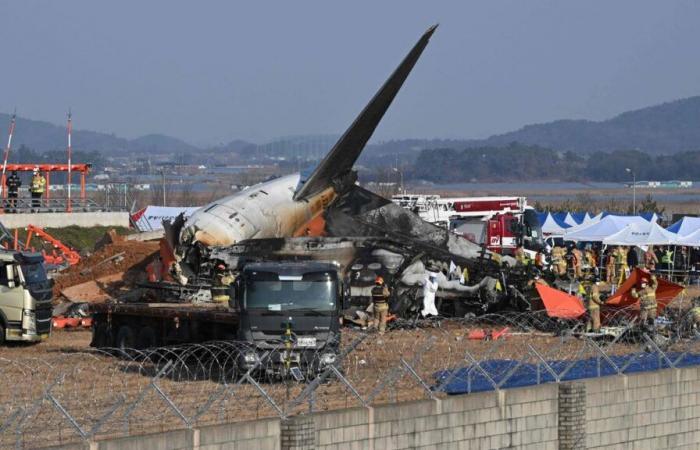According to the Korea Times cited by International mailthe authorities speak of a “collision with birds combined with unfavorable weather conditions”. Jeju Air, one of South Korea’s largest low-cost airlines, has never experienced a fatal accident since its creation in 2005.
“Difficult” identification of people
A video broadcast by local channel MBC shows the aircraft – a Boeing 737-8AS which entered service in 2009, according to the specialist site Flightradar – landing with smoke escaping from the engines. The plane hit a wall at the end of the runway and was immediately engulfed in flames.
“The passengers were ejected from the plane when it collided with a barrier, leaving them with little chance of survival,” a local fire official said during a meeting with the victims’ families. “The plane is almost completely destroyed and the identification of the deceased is proving difficult,” he added.
Images broadcast by South Korean television channels show numerous emergency service vehicles and dozens of firefighters working around the carcass of the plane, completely charred except for the tail, and evacuating on stretchers of bodies wrapped in blue shrouds.
In a country in political crisis
Acting head of state appointed Friday in a country shaken by a serious political crisis, Choi Sang-mok, chaired an emergency government meeting and is due to go to Muan on Sunday afternoon, announced his office. “All agencies concerned (…) must mobilize all available resources to save people,” he ordered in a press release.
Plane accidents are very rare in South Korea. The deadliest to have occurred in the country was the crash on a hill near Busan-Gimhae airport of an Air China Boeing 767 coming from Beijing, which left 129 dead on April 15, 2002.
Birds, a haunting
Hitting birds in flight is the dread of pilots, especially when it comes to jet planes whose engines can quickly lose power or even stop completely after ingesting a bird.
In 2009, a US Airways Airbus A320 made a forced landing in the Hudson River, in New York, after the shutdown of its two reactors which had sucked in birds. The accident became known as the “Miracle on the Hudson” as all passengers and crew escaped alive.






